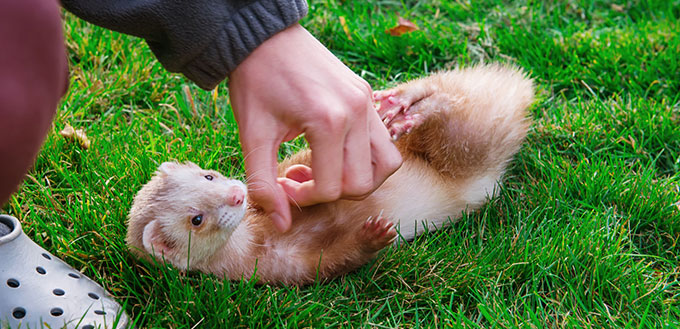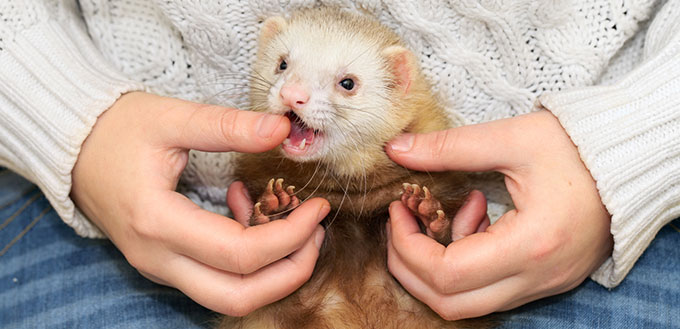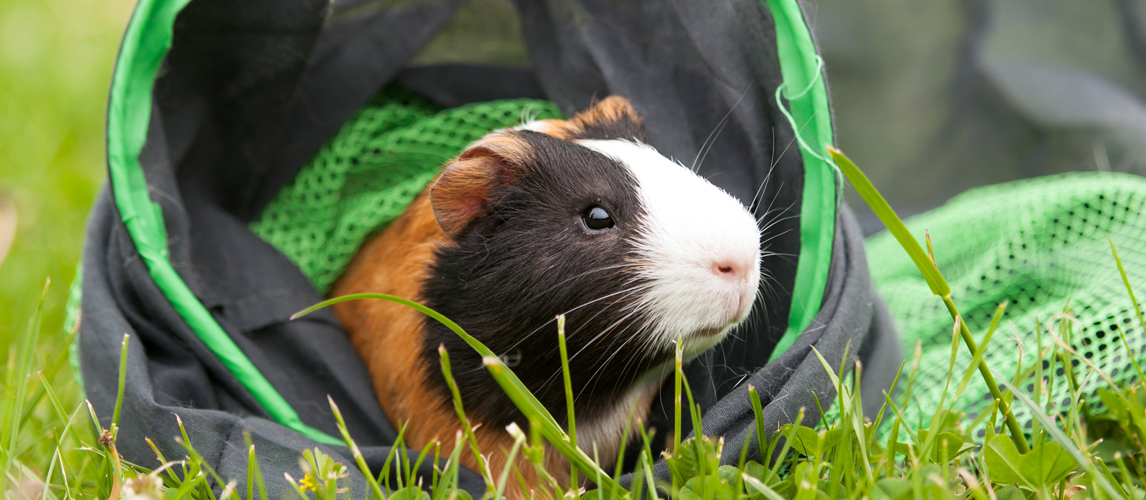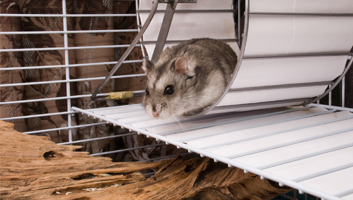Being bitten is an unpleasant aspect of being an animal lover. Sometimes, we just learn to put up with it, particularly if your pet’s attacks naturally start to diminish as they grow more attached to you. However, some animals are more prone to biting than others, and it can become important to train them out of it as soon as possible if you want to be able to have guests over or you live with children.

Do Ferrets Bite
Unfortunately, ferrets are one of the animals that are fairly frequent biters. It is a behavior known as nipping, and, unlike many other pets, your young ferret may not nip just out of self defence. It is common for ferrets to nip as part of play because it is a frequent aspect of play between ferret siblings. If anything, it is a sign of bonding and affection. However, that doesn’t make it acceptable behavior, and it is important to look into how you can train it out of them.
Why Does Your Ferret Bite
The first step to solving a nipping problem is to find the cause of the biting, as there may be something you can do to discourage the behavior. While ferrets bite for a wide variety of reasons, not all of them are unreasonable. They may be trying to tell you something, and it is always worthwhile to listen to your pets. So, here are some tips for understanding why your ferret could be biting you:
- Always be aware that young ferrets behave differently to adult ferrets.
Kits and adult ferrets can be very different, particularly if the adult ferret has had previous, successful training. Just like children, kits are often more excitable and prone to biting because they don’t know any better. Crucially, you should be aware that adult ferrets become more stubborn, so it can take much longer to train an adult ferret than a kit.
- Ferrets may be biting as a form of communication
Biting is a common form of communication between ferrets. They may bite their siblings to say anything from ‘let’s play’ to ‘get off me’. They often also extend this to communicating with you. You need to make sure you listen to them, but you must also teach them how a better way to communicate with you.
- Most commonly, ferrets bite to tell you to put them down
Most often, the message your ferret is trying to send to you when they bite you is ‘put me down’. Don’t worry, it is not necessarily a sign that you are hurting them, ferrets are just as likely to be saying ‘let go of me because I’m bored and want to go play with my brother’. Training this type of communication out of them is important to ensure you can better understand when they are biting because truly scared or hurting.
- Adult ferrets may be biting you because they do not have a good experience with humans
If you have adopted an adult ferret who still bites, it is very likely that their previous owners did not train them correctly when they were young. It may even be that your ferret has grown to dislike humans due to neglect, or worse. These ferrets may be biting because they are fear biters, and this requires completely different training. Using disciplinary methods on a fear biter may result in further anxiety and fear.
- While more common with kits, all ferrets may bite as part of play
You can’t assume an adult ferret is scared, however, as all untrained ferrets are prone to biting for play. When it comes to training your ferret to stop biting during play, a strict zero-tolerance approach is essential. Ferrets’ stubbornness will take advantage of any miscommunication or mixed message to get away with whatever they want.
Ultimately, while their individual motivations may be more nuanced, you could say there are three key reasons for a ferret to bite you, and each require different methods:
- Fear which requires more patience and comfort.
- Play which require more discipline.
- Communication which requires redirection.

Training a Ferret Not to Bite When Scared or Nervous
You must build trust between a fearful ferret and yourself. Training sessions should start short and gradually build up in length. Always end them on a success, and don’t push them too far. This may even mean you stop trying to handle them and take some time to have them learn to be more comfortable around you. However, the earlier you introduce skin-to-fur contact, the easier the transition will be.
If you have a ferret that cannot be touched yet, start by feeding the ferret directly out of your hand to acclimatize them to being near you and touching you. Once they are comfortable with that, you can try handling them again. Remember to reward calm behavior with treats, but avoid the punishments we outline below as a fear biter will just see punishment as reinforcement that humans are bad.
Related Post: Best Ferret Food
Training a Ferret Not to Bite When Playing
A ferret who bites as part of play needs strict discipline. The key to this is to act decisively and ensure you are reinforcing the message that biting is bad. You can best do this by ending playtime whenever a bite occurs. Calmly put them down and walk away. Ignoring your ferret is the best way to show them what is unacceptable behavior, but you should also reward calm behavior with treats and praise to show what behavior is preferred.
Training a Ferret Not to Bite as a Form of Communication
There are two broad steps to dealing with a communicative biter. First, you must make the effort to learn what they are trying to tell you. Occasionally, the ferret has only bitten you because you have ignored so many of their other signals. Once this happens a few times, they learn that biting is the quickest way to get your attention, and the behavior sticks. The best way to stop biting is to prevent it in the first place, by paying attention to your ferret’s communication and being attentive before they bite you.
Once they have picked up the bad habit, you must retrain and redirect them using similar methods as you may use for a play biter. Do not reward their biting by doing what they want, so this means not paying attention to them and not putting them down immediately after they bite you. You can discipline them instead and make a greater effort to reward when they are calm and use other methods to get your attention.
Disciplining Your Ferret
First of all, before you start training a ferret, you must be aware of just how stubborn they are. If you are a first-time ferret owner, you may be surprised how much longer it takes to train a ferret than your other animals. Adult ferrets will take longer still. Assuming you execute your training with little to no mistakes, as a general guide you can expect to train a kit in several weeks, while an adult ferret will take many months.
Depending on your individual ferret’s personality and previous experience with training or humans, this could take much longer, or even be a little bit quicker. To help you give your ferret the most efficient training against biting, here are some common training mistakes to avoid:
- Do not hurt your ferret
Even accidents can set training back a long time as they will remember and resent a negative incident for a long time. Make sure you and your ferret have a bond of trust for any and all training sessions.
- Do not yell at your ferret
Similarly, yelling is a very negative experience for a ferret and it will cause them to stop trusting you or even fear you. Scaring your ferret may actually cause them to start biting you more than ever, so stay calm and patient.
- Consistency is everything
While a fearful ferret may take more time than a ferret that trusts you, all ferrets need stability for training to work, so ensure you are never sending mixed messages and that your ferrets have a very stable routine.

With these guidelines in mind, you may think disciplining a ferret could become very difficult. This is not the case, there are plenty of ways to discipline your ferret that don’t risk hurting or yelling at them. They will not work overnight, but with a bit of patience, they will teach your ferret that biting is a bad behavior.
- Scruffing a ferret
Similar to cats, you can hold your ferret using the loose skin on the back of their neck without hurting them. If you grab this area and hold them up, you will be able to hold them out of biting-reach in order to tell them a firm, calm ‘No’ when they have bitten you.
- Giving a ferret a time out
You can also discipline them by putting them in a separate cage for five minutes. This should tell them that their past behavior was wrong, but you cannot leave them in there for longer than 5 minutes as they will make themselves comfortable and may even fall asleep, which will create a positive association between biting and nap time.
- Bitter tasting sprays
Bitter apple and lime sprays and pastes are available, which you can use to discourage your ferret from biting you. This is not to be used as a reactive punishment, and you shouldn’t spray your ferret with it, but rather coat areas with it they could commonly bite, such as cables, hands or ankles.
- Distractions
Last of all, you can try to redirect the biting towards more acceptable things. To do this, you will need to get ferret toys designed to be bitten. Then it is simply a case of removing yourself as a toy when they bite you and giving them ferret chew toys instead.
Sources:
- How to Train a Ferret, PetMD
- Pippa Elliott, MRCVS, How to Train a Ferret Not to Bite, WikiHow







